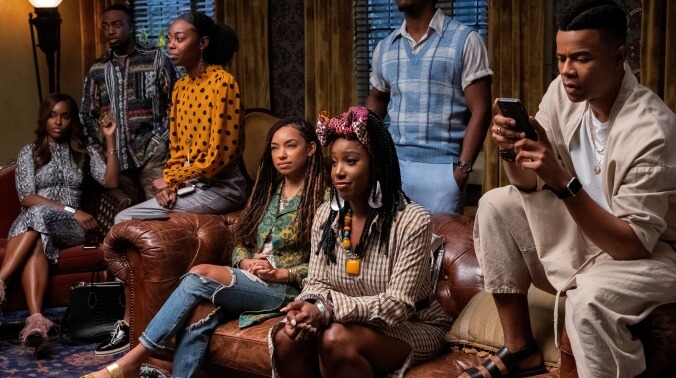Much like Winchester’s hot topic radio show, Volume 3 aims to adopt a somewhat lighter tone—a choice that gives seasoned student activist Sam White (Logan Browning) the reprieve that she deserves after the untimely death of her father. Taking some of the weight off of Sam’s storyline is, in itself, an inspired decision. There’s a lot that can be explored in what we feel entitled to from our more visible freedom fighters, and giving Sam the space to enjoy trashy television, work on her relationship with Gabe (John Patrick Amedori), and not fight for a little while is just as important as the fight itself.
But filling that space with something significant is crucial for maintaining the momentum of the previous seasons, and Volume 3’s opener, “Chapter I,” does more to establish repeatedly that things are, indeed, different (even going as far as to use Marque Richardson’s Reggie Green as a mouthpiece to explain why we should welcome the change) than it does to lay the groundwork for a fresh perspective. If anything, the new trajectory does a disservice to the characters we’ve come to know. Where is the confident Joelle who knew not to settle for less than what she deserved? What exactly happened to Lionel’s (DeRon Horton) passion for uncovering the deeply webbed truths of Winchester? Setbacks are signs of human nature and absolutely have a place in long-form storytelling; too many setbacks can cause an audience to question if the past couple of seasons actually had a point. And as enjoyable as those seasons were, they deserve a more cohesive follow-up.
For instance, the reveal of the secret society during the final moments of season two not only promised the onset of a mind-melting journey to the underbelly of Winchester, but also a potentially meatier appearance from the series’ narrator, Giancarlo Esposito. The strange twist also came with the chance to really delve into the audaciousness of privilege within academia, how long-standing systems can trump even the most despicable of circumstances. While a new character provides the entry point for such a discussion, the overall execution right up to the ending falls flat in a woefully forgettable fashion. Both Esposito and this brave, strange turn of events are barely a thought, adding to the wasted potential the series amasses over these latest 10 episodes.
Though disappointing, Vol. 3 undoubtedly has its bright spots. It is still one of the most distinct, visually breathtaking shows in television as it continues to intelligently employ warm color palettes that best complement the cast. As for the student body, this season introduces D’Unte, Lionel’s new friend-slash-mentor. Quick-witted, tender, and armed with impeccable comedic timing, Griffin Matthews rightfully stakes his claim on every scene he occupies while providing a performance that balances Dear White People’s stylistic high comedy and more earnest moments. Nia Jervier continues to elevate Kelsey beyond a deceptively lilting voice and infallibly perky attitude as she explores real heartbreak and complex friendships. Despite a personal reveal that leads to absolutely nothing, Al (Jemar Michael) is also less of a caricature this time around and more of a relentlessly impassioned burgeoning force with way more to offer than the occasional one-liner (an aspect of his personality that has always been there, but he is given a clearer voice this season, which is exciting to witness).
But Dear White People has never had a problem with an availability of interesting, solid characters, and this season is no exception. The breakdown lies in the show’s ability to push forward their individual journeys in a manner that doesn’t come off like a free-for-all, but rather like an actual development. At one point Sam is working on her film thesis, and her process includes milling around her large network of acquaintances and capturing random conversations on camera. She is repeatedly accused of stalling, or “vamping,” and it’s difficult to ignore the parallel here when the entire season feels more like a transitional period than a new destination. It seems like both Sam and Dear White People could benefit from the same advice: It’s okay if you aren’t sure what to say or do right now. Relax, maybe take a breather, and give it another try when you’re ready.



 Keep scrolling for more great stories from A.V. Club.
Keep scrolling for more great stories from A.V. Club.